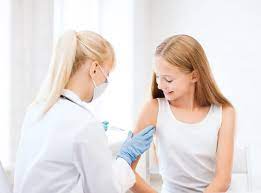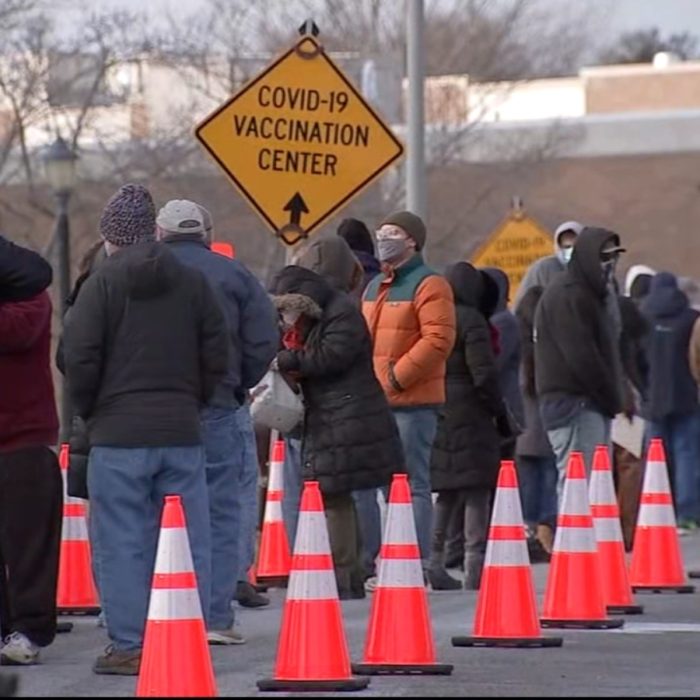
By ANDREW ABATE
Rowan College of South Jersey, located in Sewell, New Jersey and recently tabbed as the “Gloucester County Mega Vaccination Site” lives up to its lofty nickname.
As vaccine recipients such as Noah Gershon, a 21 year-old Temple University student from Cherry Hill, New Jersey, traverse the campus, they go through the tedious stops showing several different officials the appointment confirmation email they received with a QR code as well as their identification card, all while listening to megaphone-amplified orders of military officials dressed in their camouflage uniforms.
Finally, they reach the room where the nurses inject the vaccine into their arms, and they have the recipients wait 15 minutes to ensure there is not an allergic reaction to the medicine before leaving the premises.
Gershon thought the process was pretty easy and straightforward.
“When I went for my first dose, there was pretty much no line and the place was practically empty,” said Gershon in an interview. “For my second dose, there was about a 30 minute wait and it was way more crowded, but overall the process was easy and I thought they did a good job.”
Thousands of people every day have been going through this process for months now at what is currently the largest vaccination site in South Jersey. Some days have been much more crowded than others. People seeking the vaccine who went at the same time as Gershon luckily did not have to wait in seemingly endless line such as this one:
The vaccine line at Rowan College is about a 1/4 mile long. That’s ok. pic.twitter.com/chScvmRhWh
— Jason Nark ? (@JasonNark) April 9, 2021
In addition to being a vaccine mega-site, Rowan is also one of 13 colleges in New Jersey requiring residential students to be fully vaccinated for the 2021-2022 school year.
Two South Jersey institutions join a growing list of colleges in the state mandating student vaccinations for COVID-19. https://t.co/E2wlCIyMHJ
— Courier-Post (@cpsj) May 6, 2021
Rowan even went as far as to offer financial incentives for receiving vaccines.
Some colleges are requiring vaccines for on-campus students. @RowanUniversity is taking a different route now. ? https://t.co/eRNZ0If03U
— Shaina Humphries (@ShainaFOX29) May 6, 2021
Currently, over 3 million people in New Jersey have received both vaccine doses.
The goal, of course, is to eventually reach herd immunity in the U.S. to stem the tide of COVID. This is only possible if a vast majority of the American population ultimately receives the vaccine. The mega-sites will surely help achieve this goal, but it is also about getting enough people to actually go out and get the shot.
One way to help in that regard is to expand eligibility concerning who is actually allowed to receive the vaccine. The vaccine company Pfizer is working to do just that, requesting on April 9 that the Food and Drug Administration (FDA) allows them to provide the COVID-19 vaccine for children ages 12-15. The vaccine as currently stands can only be given to individuals age 16 and above. This change would only apply to the Pfizer vaccine, meaning that other vaccines, such as Moderna and Johnson & J0hnson, will not be available to this age range.
More than half of the United States population has received at least one shot, but most likely 70-90 percent of Americans will need to be fully vaccinated in order to reach herd immunity. Expanding the age range could help the country reach that goal faster and more easily.
Parental Support
Parents seem to be mostly in favor of lowering or even eliminating the minimum age requirement for vaccinations, assuming it is deemed safe for that age group. Michelle Gershon of Cherry Hill, New Jersey, who has a 15 year-old son, supports this sentiment.
“I will definitely get the vaccine for my son when it is approved,” said Gershon in an interview. “As long as it is safe, I think kids of all ages should get it.”
Sarina Davis of Cherry Hill, who has a 13 year-old son, agreed.
“I agree with that decision because I am trusting that if the FDA approves the vaccine that it will be safe for my child and it will protect from COVID,” said Davis in an email. “I will get my son vaccinated, if it is approved.”
Davis, however, was less certain about the potential of eliminating a minimum age because there is still so much unknown information regarding this new disease
“I would go with safety first, not age”, she said. “I have no idea what the minimum age should be. I think whatever age that is safe to get it should be vaccinated.”
Everyone in both the Gershon and Davis family who is eligible to get the vaccine has already done so.
Parental Opposition
The support behind providing vaccine doses to younger children is not unanimous, however. Mary Hazan of Colts Neck, New Jersey, who has a 14-year-old son, is not in favor of lowering the age requirement and added that she believes it is already too low as currently stands, and that the minimum age requirement should be 21 years old.
“They should not lower it because of their growing bodies,” said Hazan in an interivew. “It could possibly severely affect them.” She added that she will not let her son receive the vaccine for the time being. While the rest of her family (excluding the son) is vaccinated, she has elected not to get the vaccine herself.
“I do not know what could happen to me long term,” she said. “We are still unaware of all of the facts and if I have the antibodies for it. I am hesitant to get it until a year has passed and the vaccine is perfected.”
Additionally, there has always been a large number of Americans who are skeptical of receiving any kind of vaccine or allowing their children to get one, a group commonly tabbed as “anti-vaxxers”. COVID-19 is also considered to be generally milder in children compared to adults. These beliefs could also be obstacles on the path towards herd immunity despite the CDC repeatedly insisting that the vaccine is safe and effective and that children can still potentially get severely ill from the virus.
Medical Support
Despite the aforementioned potential concerns, providing the vaccine to a wider age range has also received medical support. One doctor at Virtua Primary Care in Medford, New Jersey was completely in favor of giving the vaccine to everyone in varying dose quantities depending on their age.
The doctor also pointed out that some vaccines are already given to pregnant mothers in an effort to vaccinate the baby through antibodies, and added that as part of one of the most comprehensive medical efforts in history, very intelligent people have been working around the clock to ensure that this vaccine is both safe and effective.
There are still a lot of unknown factors regarding this vaccine, including how long it immunizes the recipient for and if there are any long-term side effects. Despite these uncertainties, however, parents and doctors alike appear to be mostly in favor of providing the vaccine to as many people as is safely possible. The United States has gone to great lengths to rapidly vaccinate people, providing them in places most people would not expect to receive a shot, as shown here:




Leave a Reply
You must be logged in to post a comment.